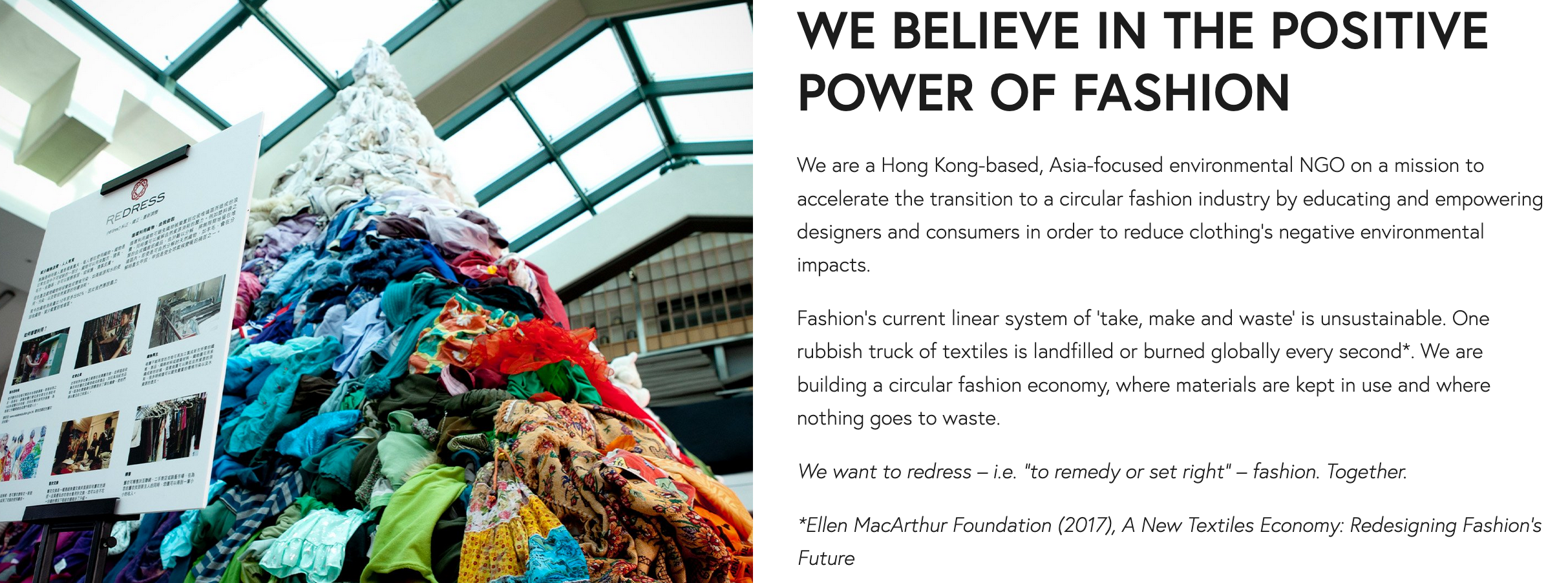AN INSIDE LOOK AT REDRESS, THE NGO TRANSFORMING HONG KONG’S TEXTILE WASTE CRISIS
By: Hillary LeBlanc
Hong Kong is facing a mounting crisis in textile waste where two in five people discard their clothes after a year or less - highlighting fast disposal habits. Many of these garments end up in a landfill, where more than 400 tonnes of textiles accumulate daily. However, Hong Kong has weak recycling infrastructure and limited textile recycling systems, creating red flags for potential landfill crisis.
These are the statistics circular fashion organizations are working with to implement awareness and change within the Hong Kong community. Redress is an organization campaigning for Hong Kongers to be more aware of their textile waste and have better practices.
Source: Akash Rai / @raiakash
Redress is a Hong Kong-based, Asia-focused environmental NGO with the goal of accelerating the transition to a circular fashion industry through education and empowering designers and consumers to reduce clothing’s negative environmental impacts. They hope to build a circular fashion economy, where materials are kept in use and nothing goes to waste. The name Redress comes from remedying or setting right the fashion industry.
The organization has various programs primarily targeting fashion designers and consumers. Redress also works with brands, manufacturers, research institutions, schools and corporations to create better ways to design, produce, purchase, use and recycle clothing. Redress has a primarily Asian focus as Asia is the world’s largest producer and consumer of textiles and apparel.
Redress Limited was founded in 2007 but since 2018, Get Redressed Month has been Hong Kong’s largest consumer awareness campaign about circular fashion. This May, the theme was ‘Your Clothes, Our Planet’, which invited Hong Kong consumers to rethink the relationship between themselves, clothing and the environment while taking an opportunity to discover other sustainable ways to embrace fashion.
During 2025 Get Redressed Month there were 178 clothing collection points created, 16.2 tonnes of unwanted clothing collected and sorted and 6800 attendees to educational talks hosted by the organization. Through the Redress Academy over 125,000 people were educated in online courses including 18,000 young students and teachers through educational resources. Following Get Redressed Month, the organisation also had a public exhibit with informative, and interactive displays. There was also a ‘sort-a-thon’ hosted, encouraging the community to gather clubs to help the organization sort through the unwanted garments.
Redress isn’t just about hosting events to change consumer habits or create awareness. They also throw an award gala, which recently celebrated its 13th edition. The Redress Design Award which is a sustainable design competition motivating designers to implement more sustainable practices into their designs. They recently announced 10 designers who use upcycling or zero waste initiatives. The winner will be announced in September. Through the Award portal Redress also offers four courses in sustainable design including zero waste design, fibre selection, design for recyclability and circular design.
Source: Redress Website
Redress had a presence at Shanghai Fashion Week in October 2024, bringing to the runway a circular fashion collection of six emerging Chinese Redress Alumni designers. This allowed their work to reach consumers and industry in the world-leading clothing and textile market. The show Redress put on also allowed for an exciting platform for promoting education, innovation, and collaboration in the fashion industry. Redress also shares news pertinent to the Hong Kong fashion community on their website. They also produce an impact report sharing the work that they do annually. Redress has 36 partners including Vogue, Soho House Hong Kong and Fashion Revolution.
Redress’ CEO, Christina Dean shares in their Impact report that textile waste is estimated to increase by about 60% between 2015 and 2030. She recognizes that the task they have undertaken is difficult but they remain steadfast and committed to helping Hong Kong make the crucial change to circular fashion.


